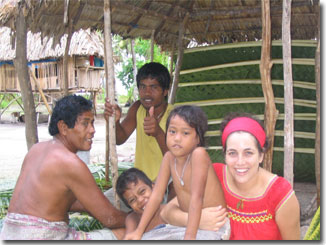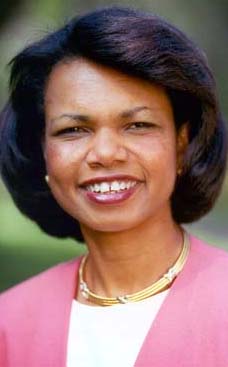
After serving as a Peace Corps volunteer, I can’t embrace a media-influenced world of people eager to consume, focused on money, promotion, and the self. There are pros and cons to every developed and developing country. Comparing them would simply be insane, so I don’t compare anymore. But I do notice. I notice how people spend their time, what they say, and what they do. I notice when a waiter gets yelled at for mistakenly putting ice in a water glass, in contrast to villagers who have to travel three hours by canoe to get ice. I notice people’s annoyances when it comes to cooking, cleaning and washing, the very chores that used to fill my village days.
Jenny Birnbaum returns from Kiribati
Peace Corps Journal Back in the USA
by Jenny Birnbaum
Caption: Peace Corps volunteer Jenny Birnbaum and friends in Kirabati.
Editor’s note: The author is a Redondo Beach native and RUHS graduate who filed occasional dispatches throughout her time as a Peace Corps volunteer in Kiribati, a remote island in the South Pacific with no electricity and few amenities. She recently returned to Redondo Beach.
Two months ago, during my Peace Corps farewell party in Kiribati, my host family dressed me in their finest: a Pepto-Bismol colored muumuu, large enough to fit three obese women. We feasted on freshly slaughtered pig, sang, danced, and said those impossible words of thanks. Life couldn’t get any better. The villagers respected me with kindness, showing appreciation for the work I was doing: teaching their children English and introducing HIV/AID education to their youth.
After living a euphoric lifestyle on a tropical island in the Pacific, I’m back home, back to a consumerist country. How am I supposed to readjust?
After serving as a Peace Corps volunteer, I can’t embrace a media-influenced world of people eager to consume, focused on money, promotion, and the self. There are pros and cons to every developed and developing country. Comparing them would simply be insane, so I don’t compare anymore. But I do notice. I notice how people spend their time, what they say, and what they do. I notice when a waiter gets yelled at for mistakenly putting ice in a water glass, in contrast to villagers who have to travel three hours by canoe to get ice. I notice people’s annoyances when it comes to cooking, cleaning and washing, the very chores that used to fill my village days.
I remember the feeling of being fully awake during my volunteer service. I struggle to obtain that feeling now. In Kiribati everyone has a role, a purpose, and importance. It’s a simple, good life. But, I’m not there anymore, I’m here in Southern California and living in memory is pathetic. I have been exposed to a utopian world and I can’t move on to the “real world” because the “real world” as we know it isn’t that great. Unfortunately, I can’t return to Kiribati permanently because my immune system turns off, leaving me vulnerable to illnesses that lead to weakness. Physically, it was a struggle, especially in those last six months. Fortunately, I had the opportunity to get a glimpse at a place where it’s greener on the other side. It doesn’t, however, have to be a geographical place. I will always be in that utopian world because, once you’ve experienced the extraordinary, you can’t go back to the ordinary.
You might be wondering what was so great about a country you’ve probably never heard of before. I didn’t know where it was either until I was given the assignment to live and work there (it is north of Fiji). The reason I loved it so much is due to my host family; they taught me how to do everything with a smile. I’m convinced it was my big appetite that won them over. When I first got there, I was like a freak show to them. They stared at me all the time — and I mean all the time. The children even watched me read. I would tell them that there has to be something more interesting then watching me read, but they kept watching me like I was a brand-new Simpsons episode.
At first I was so different from the I-Kiribati. I was white, they were brown. I spoke English, they spoke Kiribati. I didn’t suck out fish eyeballs at the dinner table. They did. I had stuff. They didn’t. I soon learned their language and began to wash my own plate after lunch and dinner. Slowly they stopped treating me like a guest and more like a member of the family. After school I’d help my host sisters wash clothes in tiny basins full of dirty well water, I’d search the island for exportable coconuts, I’d bike to the village rain tank spilling half the bucket of water on myself, and I’d go net fishing with my host brothers who taught me to kill a fish by biting its head off. I learned to live off the land, read stars, and predict tomorrow’s weather by today’s sunset. I became comfortable with silence. I became the individual I always dreamed of becoming.
Returning to the South Bay has filled me with a range of emotions:
• Confused—I see the block I grew up on through the eyes of a foreigner.
• Privileged—I don’t have to plant, hunt, kill, chase, or climb for my food. A simple trip to the supermarket will suffice.
• Saddened—People need to one-up themselves in conversations.
• Spoiled—I no longer get wet when it rains.
• Lucky—I have a doctor who can prescribe me penicillin rather than search for a particular berry that grows on the northern tip of the island.
• Shocked—People open a refrigerator full of food, stare at it for a second or two, and then say, “There’s nothing to eat.”
• Wondering—Have I gained more from my experience than I gave.
• Honored—I am a U.S. citizen who has served her country. ER














